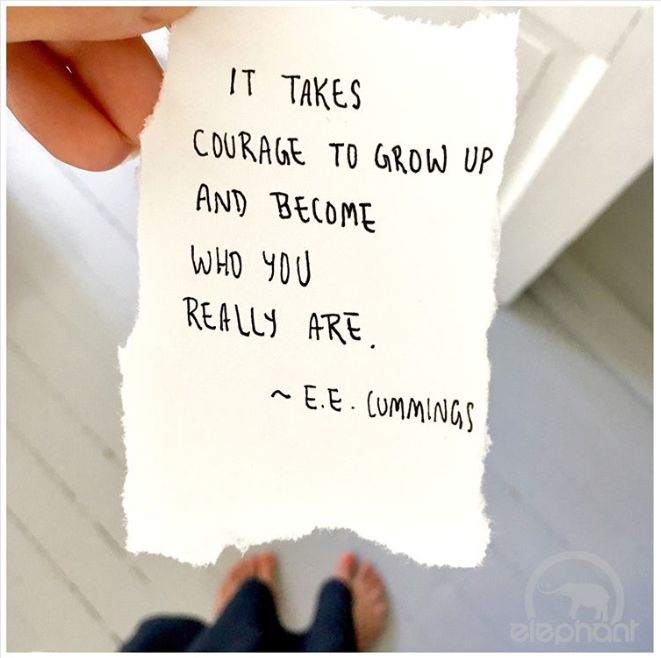My mindfulness teacher would always tell our class that we all have the teachings within us that we need to be happy.
She would often guide us through meditations and ask us to go within and find that part of us that is tender and vulnerable—the part that we’re always trying to protect by building up walls and retreating from the world.
Then she’d ask us to envision a reflection of ourselves telling us that we are safe, we are loved, and we can be at peace. It’s easy to go into that dark place when things don’t turn out the way we want them to in life.
The following letters are taken from a small notebook I’ve dedicated to writing uplifting words that I want to keep as a reminder to myself.
These letters were inspired by that part of me that is always looking out for my highest good. I’d like to share them with you now.
1. “Dear Self,
Hurt freely.
Cry freely.
Love freely.
Take solace in your own humanity.
Take refuge in the tenderness of your heart.”
This letter was inspired by the concept of Bodhicitta—the awakened heart, which Pema Chödrön likens to a raw and tender wound. I wanted to remind myself that it is okay to be vulnerable. It is okay to hurt, to love, to feel—and that this is something we should take comfort in rather than seeing one emotion as good or bad.
I believe that our emotions are a part of our human nature and to build up walls and close ourselves off is an injustice to our humanity.
2. “Dear Self,
Oft times surrender is not the answer and oft times surrender is the answer.
It is up to you to decide when it is or isn’t.”
Sometimes, I find myself having a lot of difficulty when it comes to deciding whether to keep pushing forward or to walk away when things do not work in my favour. I think it is one of the hardest decisions we must make in life and a lot of factors can come into play when choosing.
But I believe we are the only ones who can judge whether or not we are satisfied with how much effort we put into something. Sometimes, surrendering leads us to something better and sometimes perseverance is the key. I wanted to summarise that big concept in a few short words; and I also thought I was being cool with my use of the archaic term “oft times.”
3. “Dear Self,
Remember, other people’s issues are not your own.
Instead of acting out negatively, try saying:
May you be happy,
May you be at peace,
May you feel loved.”
This was inspired by a loving-kindness meditation for cultivating compassion. A lot of the time, it’s easier to react abusively toward others when they project their frustration onto us. I wanted to remind myself that instead of harbouring negative emotions toward another person—that essentially only end up hurting us—it is much easier to distance ourselves for the good of our own well-being and send positive intentions instead.
4. “Dear Self,
Real happiness is not linked to the material or the superficial.
It is a happiness inside of you that is always accessible
and can be shared with anyone.”
While this letter seems pretty straightforward, in a deeper sense I was trying to warn myself about the dangers of being attached to the physical world. The truth is that nothing lasts—change is the only constant. The things we cling to, that we associate with our happiness, and that we use to form a sense of identity can be lost at any moment. We can lose our jobs and our cars, and our health might falter despite all our efforts to live the healthiest lifestyle possible.
However, the one thing that is constant is the happiness that comes from going within, from self-acceptance. It is a happiness that is always present and that we can share with anyone we choose.
5. “Dear Self,
You have been fighting for so long but there is no need to any longer,
because I can keep you safe. I can make you happy.
And when you fall I can put you back on your feet.
So open up and experience the joys and the woes waiting in the world.
And I promise you, I will be here for all of it.”
This letter was inspired by a guided meditation that inspired the concept for these letters as well. I was feeling particularly insecure and having difficulty allowing myself to be vulnerable. The meditation involved envisioning another version of myself that came to me and reminded me that it was okay to be vulnerable—that he could protect me. It is an exercise I use to this day to foster a sense of security that allows me to be who I am without fears or doubts.
6. “Dear Mother,
Thank you for loving me
and for teaching me to love others by extension.”
This last letter isn’t a letter to myself but a letter to my mother—and to all the mothers who nurture and teach their children through love.
I hope that by sharing these letters, I can spread the warmth that they bring to me with anyone who needs them.
~











Read 1 comment and reply